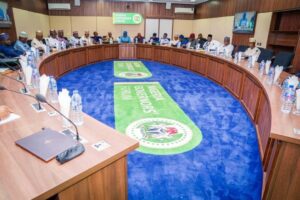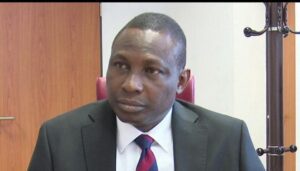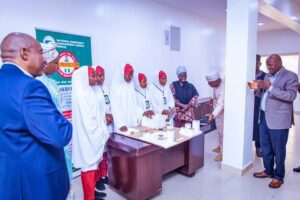


American democracy’s Trump test
By Dakuku Peterside
There is currently no evidence to support the claim that democracy is a perfect system of governance. However, humans still need to figure out a better means to guarantee the freedom and consent of the governed. Democracy remains the most practical choice available. We must keep working on it until it accurately reflects our goals because it’s an evolving idea even after many years. Because Nigeria, Africa’s largest democracy, is fashioned after the United States (US) model of liberal presidential democracy, whatever threatens democracy in that land becomes of interest to us. Recent unsavoury developments around the candidature of Donald Trump called for Nigeria to look inward and reflect on the ability of the institutions to prevail over considerations of status and sentiments.
America, the flagship of democracy, may face its first real test of the elasticity of democracy and democratic institutions. For the first time in its history, there is a likelihood that Donald Trump may be campaigning from prison or as a convicted criminal to be elected as President of the US. A Manhattan Jury has convicted Donald Trump for falsifying business records to cover up a hush-money payment to a porn star. On July 11, a New York court will give him a sentence. This raises a moral conundrum, a constitutional issue, a dilemma for the party, electoral questions, and a logistics challenge.
Some pertinent rhetorical questions merit consideration: can Trump run for office, and what does the US Constitution say? Can the Republican Party replace Trump, and is there a precedence? Can the party system survive a deadly jolt in the event that the law eventually disqualifies Trump? Mr Trump is registered to vote in Florida, and the law of that state bars convicted people; can Mr Trump vote? Can Mr Trump be elected while in prison, and is there a constitutional provision to guarantee this? What if Mr Trump is convicted in other states where he is facing more criminal proceedings? What are the implications? These questions will test the US Constitution and presidential transition tradition as it has never done before.
Although I will not attempt to answer most of these rhetorical questions, I boldly posit some facts that deserve attention. The US Constitution does not disqualify a person convicted from running for the office of President. Consequent to the preceding, a court’s conviction of Donald Trump will not prevent or disqualify him from running for the said office. In the case of Nigeria, Section 137 lists grounds for disqualifying a person standing for election to the office of President, and it includes a trial Court conviction that must have taken place within a period of less than ten years before the date of the election to the office of President, and the said conviction must be in respect of an offence involving dishonesty or the person has been found guilty of the contravention of the Code of Conduct. In essence, not all court convictions apply in Nigeria. A sentence that does not border on fraud, financial crimes or forgery will not count or lead to the disqualification of a person running for President. We may recall that this issue arose at the last presidential election petition trial, and legal experts argued this point.
Besides, the US Constitution overrides any State law, particularly the Florida State law prohibiting a convict from voting. This Florida State Law will only apply if such a conviction occurred in Florida or was made by a Florida Court. In this way, Donald Trump has not been convicted by the State of Florida, and the said Florida State law will not apply or be enforced against him. However, while a convict can still run and win a presidential election in the US, the nature of the sentence may prevent him from occupying the office.
The implications of all of these are still on us. This marks the first-ever conviction of a sitting or former President in American history for a criminal offence. A triumph for accountability and the fundamental idea that no one in a democracy is above the law—not even the highest elected official—this momentous milestone is also a victory for soberness. Trump’s conviction shows how a working democratic system can achieve justice. It serves as a reminder that we cannot discuss democracy without bolstering the judiciary’s independence built on solid political culture and institutional resilience. This is a painful spot in Nigeria’s democratic journey right now. The only thing that can ensure the preservation of democracy and our freedom is an impartial, courageous, and independent judiciary.
The stress tests American democracy faces reveal the resilience and fragility of democratic systems, especially the institutions. Learning from these challenges allows Nigeria to build a more robust and responsive democracy. This stressor provides valuable insights into the strengths and vulnerabilities of democratic governance, which can be instructive for countries like Nigeria, which has a complex democratic landscape.
The first lesson is the supremacy of the rule of law. No one is above the law, and no matter how highly placed, they must be subjected to the accountabilities and dictates of the law. Reminding future generations that nobody is above the law in a democracy is essential, and we must strengthen our democratic institutions so they can withstand any bully. Creating strong institutional structures is vital to withstand the most heinous attacks on democracy.
The second lesson is that we must fortify the other two arms of government – the legislature and judiciary against executive capture. Any attack on democracy from the executive arm, either still in power or out of power, must be resisted by the legislature and judiciary. The legislature must make clear laws that can easily overcome divisiveness, not opaque ones that become easy political tools. The judiciary must dispense justice equitably and responsibly. The weaker a legislature or the judiciary is, the easier it is for leaders from the executive arm to exploit the system, either to expand their power or to take down an opponent. Furthermore, weak institutions of democracy could manipulate facts like supple political stupidity.
The third lesson is that the Nigerian state must declare a war on corruption and hold all corrupt people accountable. The fight against corruption should not be limited to politicians and politically exposed people but must cover corrupt businesses, public servants, and civil society. Like the case of Trump, his first conviction was not based on his action while in office but based on his seemingly private affair that hovers around how he handled his books and hush money for the porn star he was accused of having sexual entanglement. The question we must ask ourselves is, can a seemingly innocuous thing, albeit a crime, force a former president in Nigeria to be convicted of a felony? We know of media sleaze of infractions and alleged corruption by high-powered politicians, but after a while, we hear nothing again about the prosecution of the case, and sometimes we hear of such people receiving national awards or portfolios of office without being acquitted by a court of law for the alleged crime.
The fourth lesson is that no criminal should be allowed to become the President of Nigeria. Americans did not foresee a future where a strong candidate like Trump would emerge as a party frontrunner with convictions hanging on his neck, but now it has happened. The example of Eugene V. Debs, a socialist leader who appeared as a candidate from prison and ran for the presidency, should have guided their legal framework, but America has a way with a history that their democracy does not fall apart. That cannot be said of an emerging democracy like Nigeria. Just like it happened to us during the death of Umaru Yar’adua and for days, lawyers were struggling with the instrument to use until the “doctrine of necessity” was invoked, this is the best time to review the constitution to amend any ambiguity in our laws to protect our democracy.
The fifth lesson is that Nigeria must tackle economic inequality, which creates a huge class divide that makes some feel above the law. Policies to reduce economic disparities through education, healthcare, and social welfare programmes can strengthen social cohesion and democratic stability. Developing strategies that promote inclusive economic growth and providing opportunities for all segments of society is critical for maintaining long-term democratic health.
Nigeria must fortify its democratic foundations and ensure a stable and inclusive political future.
Building solid institutions and an excellent democratic political culture steeped in democratic principles and ethos de-emphasises the power of political agents, especially those so powerful that they exert a considerable influence on the entire political system. Everyone across the political divide must work collaboratively to defend our democracy. Encouraging dialogue across political divides and fostering a culture of bipartisan cooperation can mitigate polarisation. Civic education that promotes understanding and respect for diverse viewpoints is essential. We must protect our democracy at all costs!



